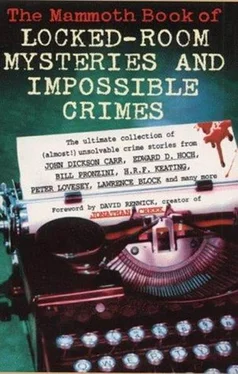Mike Ashley - The Mammoth Book of Locked-Room Mysteries And Impossible Crimes
Здесь есть возможность читать онлайн «Mike Ashley - The Mammoth Book of Locked-Room Mysteries And Impossible Crimes» весь текст электронной книги совершенно бесплатно (целиком полную версию без сокращений). В некоторых случаях можно слушать аудио, скачать через торрент в формате fb2 и присутствует краткое содержание. Жанр: Детектив, на английском языке. Описание произведения, (предисловие) а так же отзывы посетителей доступны на портале библиотеки ЛибКат.
- Название:The Mammoth Book of Locked-Room Mysteries And Impossible Crimes
- Автор:
- Жанр:
- Год:неизвестен
- ISBN:нет данных
- Рейтинг книги:3 / 5. Голосов: 1
-
Избранное:Добавить в избранное
- Отзывы:
-
Ваша оценка:
- 60
- 1
- 2
- 3
- 4
- 5
The Mammoth Book of Locked-Room Mysteries And Impossible Crimes: краткое содержание, описание и аннотация
Предлагаем к чтению аннотацию, описание, краткое содержание или предисловие (зависит от того, что написал сам автор книги «The Mammoth Book of Locked-Room Mysteries And Impossible Crimes»). Если вы не нашли необходимую информацию о книге — напишите в комментариях, мы постараемся отыскать её.
A new anthology of twenty-nine short stories features an array of baffling locked-room mysteries by Michael Collins, Bill Pronzini, Susanna Gregory, H. R. F. Keating, Peter Lovesey, Kate Ellis, and Lawrence Block, among others.
The Mammoth Book of Locked-Room Mysteries And Impossible Crimes — читать онлайн бесплатно полную книгу (весь текст) целиком
Ниже представлен текст книги, разбитый по страницам. Система сохранения места последней прочитанной страницы, позволяет с удобством читать онлайн бесплатно книгу «The Mammoth Book of Locked-Room Mysteries And Impossible Crimes», без необходимости каждый раз заново искать на чём Вы остановились. Поставьте закладку, и сможете в любой момент перейти на страницу, на которой закончили чтение.
Интервал:
Закладка:
“I guess he’s really going to spend the next four hours in there,” I said.
“He always does.”
“I’d go for a drive,” I said, “but I don’t have a car. I suppose I could go for a walk. It’s a beautiful day, bright and sunny. Of course your husband doesn’t allow sunlight into the library, but I suppose he lets it go where it wants in the rest of the neighbourhood.”
That drew a smile from her.
“If I’d thought ahead,” I said, “I’d have brought something to read. Not that there aren’t a few thousand books in the house, but they’re all locked away with Karl.”
“Not all of them,” she said. “My husband’s collection is limited to books published before 1975, along with the more recent work of a few of his very favourite authors. But he buys other contemporary crime novels as well, and keeps them here and there around the house. The bookcase in the guest room is well stocked.”
“That’s good news. As far as that goes, I was in the middle of a magazine story.”
“In Ellery Queen , wasn’t it? Come with me, Mr Rhodenbarr, and I’ll-”
“Bernie.”
“Bernie,” she said, and coloured slightly, those dangerous cheekbones turning from ivory to the ink you find inside a seashell. “I’ll show you where the guest room is, Bernie, and then I’ll bring you your magazine.”
The guest room was on the second floor, and its glassed-in bookcase was indeed jam-packed with recent crime fiction. I was just getting drawn into the opening of one of Jeremiah Healy’s Cuddy novels when Eva Bellermann knocked on the half-open door and came in with a tray quite like the one she’d brought her husband. Coffee in a silver pot, a gold-rimmed bone china cup and saucer, a matching plate holding shortbread cookies. And, keeping them company, the issue of EQMM I’d been reading earlier.
“This is awfully nice of you,” I said. “But you should have brought a second cup so you could join me.”
“I’ve had too much coffee already,” she said. “But I could keep you company for a few minutes if you don’t mind.”
“I’d like that.”
“So would I,” she said, skirting my chair and sitting on the edge of the narrow captain’s bed. “I don’t get much company. The people in the village keep their distance. And Karl has his books.”
“And he’s locked away with them…”
“Three hours in the morning and four in the afternoon. Then in the evening he deals with correspondence and returns phone calls. He’s retired, as you know, but he has investment decisions to make and business matters to deal with. And books, of course. He’s always buying more of them.” She sighed. “I’m afraid he doesn’t have much time left for me.”
“It must be difficult for you.”
“It’s lonely,” she said.
“I can imagine.”
“We have so little in common,” she said. “I sometimes wonder why he married me. The books are his whole life.”
“And they don’t interest you at all?”
She shook her head. “I haven’t the brain for it,” she said. “Clues and timetables and elaborate murder methods. It is like working a crossword puzzle without a pencil. Or worse – like assembling a jigsaw puzzle in the dark.”
“With gloves on,” I suggested.
“Oh, that’s funny!” She laughed more than the line warranted and laid a hand on my arm. “But I should not make jokes about the books. You are a bookseller yourself. Perhaps books are your whole life, too.”
“Not my whole life,” I said.
“Oh? What else interests you?”
“Beautiful women,” I said recklessly.
“Beautiful women?”
“Like you,” I said.
Believe me, I hadn’t planned on any of this. I’d figured on finishing the Lovesey story, then curling up with the Healy book until Karl Bellermann emerged from his lair, saw his shadow, and paid me a lot of money for the book he thought I had stolen.
In point of fact, the Fer-de-Lance I’d brought him was legitimately mine to sell – or very nearly so. I would never have entertained the notion of breaking into Nizar Gulbenkian’s fieldstone house in Riverdale. Gulbenkian was a friend as well as a valued customer, and I’d rushed to call him when I learned of his loss. I would keep an ear cocked and an eye open, I assured him, and I would let him know if any of his treasures turned up on the grey or black market.
“That’s kind of you, Bernie,” he’d said. “We will have to talk of this one day.”
And, months later, we talked – and I learned there had been no burglary. Gulbenkian had gouged his own front door with a chisel, looted his own well-insured library of its greatest treasures, and tucked them out of sight (if not out of mind) before reporting the offence – and pocketing the payoff from the insurance company.
He’d needed money, of course, and this had seemed a good way to get it without parting with his precious volumes. But now he needed more money, as one so often does, and he had a carton full of books he no longer legally owned and could not even show off to his friends, let alone display to the public. He couldn’t offer them for sale, either, but someone else could. Someone who might be presumed to have stolen them. Someone rather like me.
“It will be the simplest thing in the world for you, Bernie,” old Nizar said. “You won’t to do any breaking or entering. You won’t even have to come to Riverdale. All you’ll do is sell the books, and I will gladly pay you ten per cent of the proceeds.”
“Half,” I said.
We settled on a third, after protracted negotiations, and later over drinks he allowed that he’d have gone as high as forty per cent, while I admitted I’d have taken twenty. He brought me the books, and I knew which one to offer first, and to whom.
The FDR Fer-de-Lance was the prize of the lot, and the most readily identifiable. Karl Bellermann was likely to pay the highest price for it, and to be most sanguine about its unorthodox provenance.
You hear it said of a man now and then that he’d rather steal a dollar than earn ten. (It’s been said, not entirely without justification, of me.) Karl Bellermann was a man who’d rather buy a stolen book for a thousand dollars than pay half that through legitimate channels. I’d sold him things in the past, some stolen, some not, and it was the volume with a dubious history that really got him going.
So, as far as he was concerned, I’d lifted Fer-de-Lance from its rightful owner, who would turn purple if he knew where it was. But I knew better – Gulbenkian would cheerfully pocket two-thirds of whatever I pried out of Bellermann, and would know exactly where the book had wound up and just how it got there.
In a sense, then, I was putting one over on Karl Bellermann, but that didn’t constitute a breach of my admittedly elastic moral code. It was something else entirely, though, to abuse the man’s hospitality by putting the moves on his gorgeous young wife.
Well, what can I say? Nobody’s perfect.
Afterward I lay back with my head on a pillow and tried to figure out what would make a man choose a leather chair and room full of books over a comfortable bed with a hot blonde in it. I marvelled at the vagaries of human nature, and Eva stroked my chest and urged a cup of coffee on me.
It was great coffee, and no less welcome after our little interlude. The cookies were good, too. Eva took one, but passed on the coffee. If she drank it after lunchtime, she said, she had trouble sleeping nights.
“It never keeps me awake,” I said. “In fact, this stuff seems to be having just the opposite effect. The more I drink, the sleepier I get.”
“Maybe it is I who have made you sleepy.”
Читать дальшеИнтервал:
Закладка:
Похожие книги на «The Mammoth Book of Locked-Room Mysteries And Impossible Crimes»
Представляем Вашему вниманию похожие книги на «The Mammoth Book of Locked-Room Mysteries And Impossible Crimes» списком для выбора. Мы отобрали схожую по названию и смыслу литературу в надежде предоставить читателям больше вариантов отыскать новые, интересные, ещё непрочитанные произведения.
Обсуждение, отзывы о книге «The Mammoth Book of Locked-Room Mysteries And Impossible Crimes» и просто собственные мнения читателей. Оставьте ваши комментарии, напишите, что Вы думаете о произведении, его смысле или главных героях. Укажите что конкретно понравилось, а что нет, и почему Вы так считаете.










